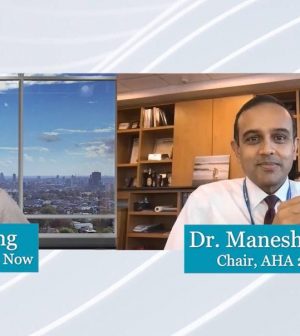- Almost 1 in 3 Americans Know Someone Who’s Died From a Drug Overdose
- 1 in 8 Older Americans Are Stricken With Traumatic Head Injury
- Could Tough Workouts Trigger a Hot Flash?
- U.S. Deaths Linked to ATVs Rose by a Third in One Year
- Stress, Discrimination Add to Cancer Burden for LGBTQ+ Americans
- Suicidal Impulses May Peak During Restless Nights
- After Dobbs, a Rise in Out-of-State Patients for Abortion in Washington State
- Night Owls Could Be Upping Their Mental Health Risks
- Amsterdam’s ‘Psychiatric Ambulance’ Could Be Advance For Those in Mental Health Crisis
- Caffeine Affects Dopamine Function in Parkinson’s Patients
Advances in Care, Impact of COVID Highlights of Latest Cardiologists’ Meeting

The COVID-19 pandemic, heart-healthy eating, and better ways to treat and prevent heart disease were among the hot topics that emerged during the American Heart Association’s annual meeting this week.
“I was at the sessions yesterday, I was actually in clinic this morning, and there were things I learned at the sessions that are affecting how I care for my patients,” Dr. Manesh Patel, chair of the meeting, said during a HealthDay Now interview.
Heart doctors are still grappling with the impact of the COVID-19 pandemic on people’s heart health, and that served as one theme of the meeting, said Patel, chief of cardiology with the Duke University School of Medicine, in Durham, N.C.
One major study tracking more than 1.7 million patients found that efforts to control blood pressure dramatically slipped during the pandemic, increasing those folks’ chance of heart attack, stroke and heart disease.
The percentage of people whose blood pressure was under control slipped from 60% prior to COVID to about 50%.
“A 10% loss in people that have controlled blood pressure, just for that first six- to 12-month window of COVID — we know that unfortunately that will lead to aftereffects of the pandemic, with higher rates of cardiovascular events for many people,” Patel said.
On the other hand, an opening lecture at the meeting put into perspective the risk of myocarditis caused by COVID-19 vaccines, Patel said.
The speaker noted that rates of myocarditis in vaccine clinical trials probably were overstated, because the biochemical used to diagnose heart inflammation and damage can be abnormally increased in young males, he said.
According to the U.S. Centers for Disease Control and Prevention, the rate of myocarditis among vaccine recipients “is maybe 30 to 50 times less than the rate associated with COVID itself, and is much less associated than all the other co-morbidities that happen when you get COVID,” Patel explained.
“I have a 14-year-old daughter and a 16-year-old son and both have gotten vaccinated,” he said. “I see the benefits of the vaccine [to be] much greater than the risk.”
Healthier eating
The meeting also included a discussion of the AHA’s new dietary guidelines, which were revamped for the first time in 15 years just before the sessions.
The new heart-healthy diet guidelines focus more on patterns of eating and making sure that you burn more calories than you eat, Patel said.
“Even though that sounds very straightforward, that then leads to, can you get in the habit of activity? Can you get in the habit of understanding what your daily weight is? Can you get into the habit of watching what you eat and how much you eat?” Patel said.
In general, he advised, people should try to eat more plant-based foods and lean meats, restrict their intake of salt and sugar, and avoid processed foods.
“There are 10 really nice straightforward rules that aren’t about oh, this is a good food or that is a bad food. Too much of our life is spent trying to figure out what’s a good food or a bad food versus what are habits and patterns that lead you to a healthier lifestyle,” Patel said.
New advances in care
Cutting edge studies presented at the meeting also gave heart doctors a better idea of how to improve care for patients:
- Doctors probably should go forward with surgery to replace a narrowed aortic valve, even if the patient has no symptoms, one clinical trial found. “That seemed to show that the sooner you go to get a valve replaced in good surgical centers, the better patients do,” Patel said. “Even at two years, once you get to two to three to four years, these patients start to do worse.”
- Heart surgeons might want to fix other heart valves that are leaking if they’re already replacing one, found another trial looking at mitral and tricuspid valve replacements. “Repairing that at the same time significantly improved that tricuspid valve. Some of those patients did require more pacemakers, but it seemed like most patients would benefit if they did get the tricuspid valve intervened on,” Patel said.
- Doctors don’t necessarily need to wait for a patient’s blood thinner to fully leave their system before they perform heart surgery: A trial found no increased bleeding risk if the blood thinner ticagrelor was stopped two to three days prior to bypass surgery.
“If you went early, it wasn’t a detriment,” Patel said. “Sometimes waiting four or five days, people can have events.”
Finally, a major trial out of China showed the impact that local, hands-on efforts to control blood pressure can have on community health.
In the study, community health workers with some basic medical training — “village doctors” — helped reduce high blood pressure throughout 326 villages in rural China. These village doctors coached people on lifestyle changes to control blood pressure, and motivated them to take their medications regularly.
About 57% of people with high blood pressure achieved normal levels after 18 months of participation in the village doctor-led program, compared to 20% of people who received usual care.
“Those villages that had that intervention for local blood pressure control and treatment significantly reduced blood pressure — 15 mm, a huge reduction that likely will lead to cardiovascular event reduction,” Patel said.
More information
The American Heart Association has more about its annual meeting here.
SOURCES: Manesh Patel, MD, chief, cardiology, Duke University School of Medicine, Durham, N.C.
Source: HealthDay
Copyright © 2024 HealthDay. All rights reserved.










